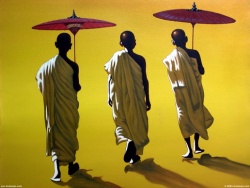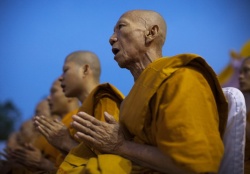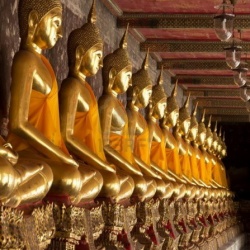SAKADAWA FESTIVAL
SakaDawa Festival; The most important festival for Tibetan Buddhism, the 'Saka Dawa Festival' commemorates Shakyamuni's Buddhahood and the death of his mortal body.
Saga Dawa also stands for the Disu month in the Tibetan language; Disu is one of the 28 constellations of astrology in Tibetan calendar. Because the Disu appears in the fourth month of Tibetan calendar, this month is called as the Disu month, i.e. Saga Dawa. In Indian tradition, this month is called Vaisakhi and the full-moon day called Buddha Purnima.
Sometimes, due to a discrepancy in the solar and lunar calendar, the celebration of the Buddha Purnima and Saka Dawa can differ as much as one month.
Why is Saga Dawa special?
During this month, most of the important events in the life of Gautam Buddha happened. For example: His birthday, accepting the vows of a monk, the day of his Parinirvana (Death), and, most importantly, the day when he was enlightened all fall in this month. So it is believed that any merits that are collected during this month will have multiple effects. Therefore avoiding negative deeds and engaging in positive deeds, especially during this month is advocated. The following of the eight Mahayana precepts for 24 hours on holy days is recommended during this period.
The precepts are :
Not to kill
Not to lie
Not to steal
Not to engage in any sexual activity
Not to take intoxicants
Not to eat food at the wrong times (explained below)
Not to sit on large, high or expensive beds (your average, normal bed is fine)
Not to sing, dance or play music
Not to wear perfume, garlands or ornaments (watches and malas are fine but not other decorative jewelry even if its Buddhist jewelry)
The rules about food (if you take precepts): You may have a light breakfast and your lunch (as large as you want) must be finished by noon. If this is not possible, eat it as soon as you can. When you have stopped eating for 15 minutes, you can not eat again until you wake in the morning. No dinner or snacks. No "dark foods" such as eggs, meat, onions, garlic, or radishes.
There are many virtuous things you can do during this very special day (or any day). Some suggestions are below:
Put offerings on an altar.
Meditate.
Any Buddhist practice.
Mentally offer beautiful things you pass on the way to and from work (i.e. everything inside a grocery store, or jewelry store).
During this Sakadawa month, at every monastery sutras are recited and 'Cham' dances are performed. It is said that good deeds in the month of this festival multiply 300 fold (some put this number at 10,000) in return and this leads many people to donate large sums to the religious orders, monasteries and to the beggars that gather at this time of year.
Gods in the heavens are believed to descend to the mortal world on this day. Incense is burnt in large scale and picnicking is enjoyed in the public parks. The 15th day of the fourth month on the Tibetan calendar is said to be the birthday of Sakyamuni.
This is also the day when he died and attained Nirvana.
In some places, such as in Sri Lanka, temples, towns and villages are beautifully decorated with colorful garlands and lights with images of the Buddha. On the full moon night of the month, images of the Buddha and representations such as relics are carried in long processions on ornamented elephants and chariots.
In Tibet, during this period, hundreds of thousands of people turn their prayer wheels on the street in Lhasa, and then paddle boats in the Dragon King Pool, and sing and dance in the afternoon. During the month of Saka-Dawa, marking Buddha's birth, enlightenment and Parinirvana, many people join celebration and the monks in making tens of thousands of water bowl and light offerings to the Buddhas in the ten directions.
Source
http://philipmarshall.net/migyul/resources/culture/saka_dawa.htm



